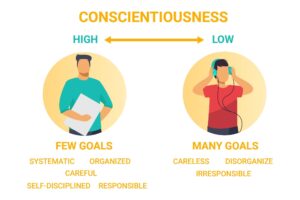Introverts vs. Extraverts
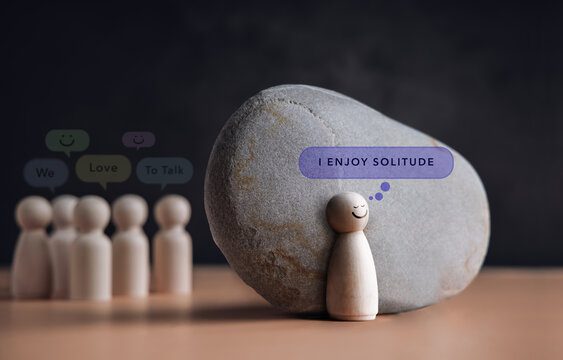
Most people think being Introverted or Extraverted is as simple as falling into one of two boxes:
Would you rather stay home on a Friday night in your pajamas or go out to the bars with a big group of friends?
Would you rather be the center of attention or stay as far away from the spotlight as possible?
But the truth is, your personality is not that black and white. Nevertheless, there are some physiological differences between introverts and extraverts.
Extraversion is the personality trait that seeks fulfillment from sources outside the self. In everyday language, we often use the label introvert to describe people who are low in extraversion.
Still, personality researchers generally talk about low versus high extraversion rather than about introverts and extraverts.
Partly, that avoids thinking of extraversion and introversion as if they are personality types and avoids the confusion that introversion is somehow the opposite of extraversion, which it isn’t
Introverts fall at the lower end of the normal distribution of extraversion scores. While introverts may prefer fewer social interactions than extraverts, this does not mean they dislike interacting with other people altogether.
In addition, introverts may be less assertive than extroverts but are not necessarily nonassertive or submissive.
Extraversion Traits
The traits associated with Extraversion are:
- Sociableness
- Assertiveness
- Merriness
- Outgoing nature
- Energy
- Talkativeness
- Ability to be articulate
- Fun-loving nature
- Tendency for affection
- Friendliness
- Social confidence
People who are high in these traits are outgoing and tend to gain energy in social situations. Those who are low in this trait are called introverts.
Facets of Extraversion
1. Warmth
- High Score – Tends to be friendly and shows interest in others.
- Low Score – Tends to be reserved and does not open up to people immediately.
2. Gregariousness
- High Score – Enjoys and prefers the company of others rather than solitude.
- Low Score – Prefers a small group of trusted people and quiet time alone.
3. Assertiveness
- High Score – Likes to be famous / Expresses themselves forcefully.
- Low Score – Prefers not to be the center of attention. Keeps thoughts and feelings to themselves.
4. Activity Level
- High Score – Thrives at large social gatherings. More prone to boredom when alone.
- Low Score – Prefers solitary activities such as reading, fishing, writing, computer games, etc.
5. Excitement Seeking
- High Score – Seeks novelty and needs external stimuli.
- Low Score – Prefers low-key activities. Self-sufficient. They find too much stimulation overwhelming.
6. Positive Emotions
- High Score – A higher tendency to experience positive emotions, even alone. Easily pleased. It attracts more life circumstances, which leads to more positive effects.
- Low Score –Does not feel rewarded by external stimuli. Gets their rewards from reflective activities. Requires more positive reinforcement to be happy.
Extraversion Sociability
The higher people score in extraversion, the more they enjoy interacting with others.
Compared to people who are low in extraversion, people who are high in extraversion are more gregarious, enjoy social gatherings more—including large parties—and seek out opportunities to interact with others more often.
And, as you would expect, when they’re in social situations, people who are high in extraversion are more talkative than people low in extraversion.
People high in extraversion are so highly motivated to interact with others that they sometimes search just for somebody to talk to when alone for a long time.
Some of the best evidence for behaviors associated with low and high extraversion has examined behavior during everyday life.
In one study, participants completed a measure of extraversion and then wore an electronically activated recorder as they went about their daily lives.
This recorder was programmed to turn on for a few minutes randomly throughout the day, providing objective data about the participants’ activities.
Analyses of the recorded data showed that participants who scored higher in extraversion were much more likely to interact with other people when the recorder was activated than participants who were lower in extraversion.
Extraversion Genetic Connection
According to a study by genetic specialist Dean Hamer of the National Cancer Institute in Bethesda, Maryland, our tendency for extraversion is genetic.
Extraversion has 54% genetic influence.
Studies have shown that the amount of blood that passes through some brain regions determines extraversion/introversion.
Extraverts have more blood flowing through their temporal lobes, the part of the brain involved with emotional and sensory experience.
Introverts have more blood flow in their frontal lobes, which deals with problem-solving and internal processing.
Introverted vs. Extraverted Dopamine Differences
One significant difference between people with introverted and extraverted brains is how we respond to the neurotransmitter dopamine.
People high in extraversion have been found to carry long forms of the gene DRD4. This gene dictates how we produce dopamine.
Those who carry the long form of the gene DRD4 have more dopamine production after a positive experience.
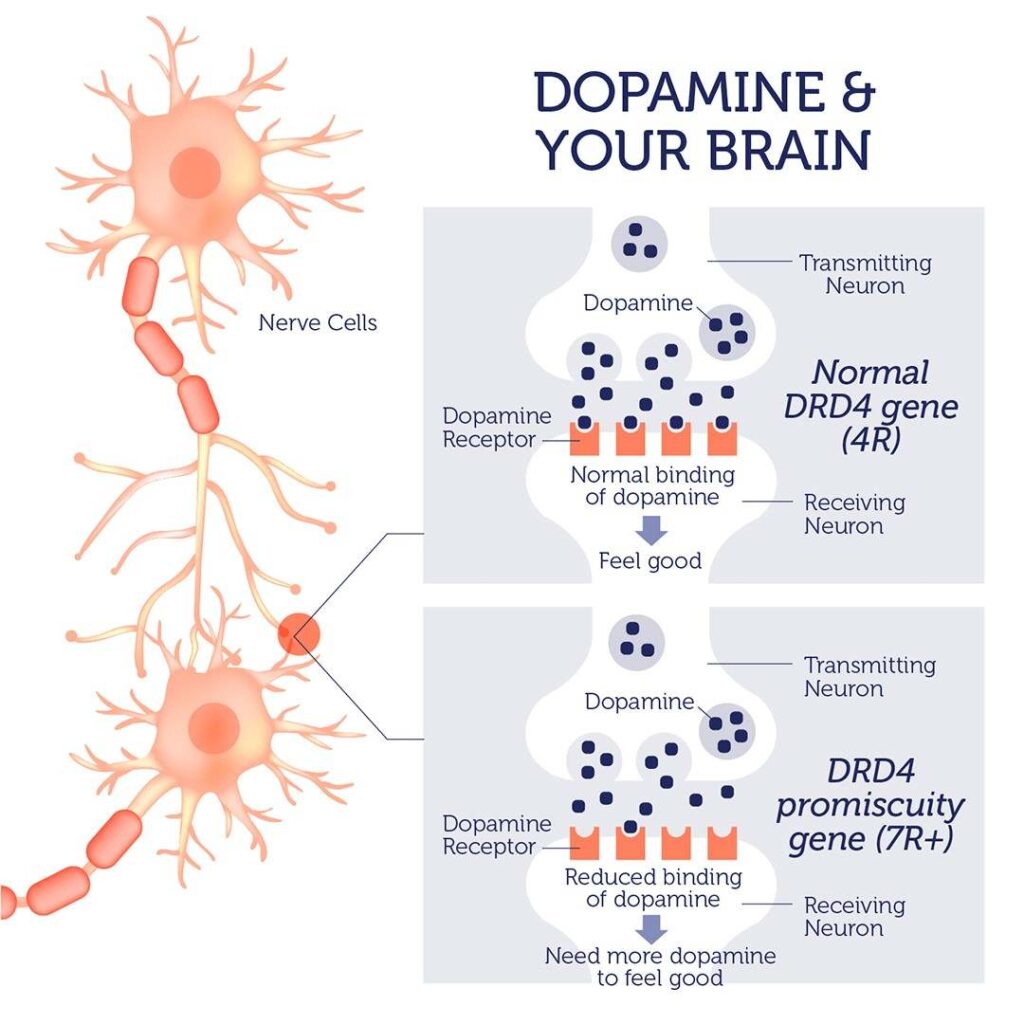
In other words, high extraverts might be wired to seek more social experiences because they get a more significant chemical pleasure to boost.
Dopamine is a chemical released in the brain that motivates people to seek external rewards, such as earning money, climbing the social ladder, attracting a mate, or getting selected for a high-profile project at work. When dopamine floods the brain, introverts and extraverts become more talkative, alert to their surroundings, and motivated to take risks and explore the environment.
Introverts do not have less dopamine in their brains than extraverts do. Both introverts and extraverts have the same amount of dopamine available.
The difference is in the activity of the dopamine reward network. It is more active in extroverted brains than in introverted brains.
Introverted vs. Extraverted Acetylcholine Differences
Introverts prefer to use a different neurotransmitter called acetylcholine,
Like dopamine, acetylcholine is linked to pleasure. It makes us feel good when we turn inward. It powers our abilities to think deeply, reflect, and focus intensely on just one thing for an extended period.
This also helps explain why introverts like calm environments—it’s easier to turn inward when we aren’t attending to external stimulation. When I lounge at home in quiet solitude, lost in a book or watching Netflix, I’m basking in the pleasant effects of acetylcholine.
Introverted vs. Extraverted Nervous System Differences
Another piece of the introvert-extravert puzzle has to do with the nervous system.
Acetylcholine is linked to the nervous system’s parasympathetic side, nicknamed the “throttle down” or “rest-and-digest” side. When we engage the parasympathetic side, our body conserves energy and withdraws from the outer environment. As a result, our muscles relax, energy is stored, food is metabolized, pupils constrict to limit incoming light, and our heart rate and blood pressure lower. Our body gets ready for hibernation and contemplation—two things introverts like the most.
Both introverts and extraverts use both sides of their nervous systems simultaneously, just like they use both neurotransmitters. However, extraverts tend to favor the opposite side of the nervous system: the sympathetic side, known as the “full-throttle” or “fight, flight, or freeze” system. This side mobilizes us to discover new things and makes us active, daring, and curious. The brain becomes alert and hyper-focused on its surroundings. Blood sugar and free fatty acids are elevated to give us more energy, and digestion is slowed. Thinking is reduced, and we become prepared to make snap decisions. While extraverts thrive on the dopamine-charged good feelings created when they engage the sympathetic side, it’s too much for introverts.
Extraversion as a Personality Trait
Many contemporary personality psychologists believe that there are five basic dimensions of personality, often referred to as “Big Five” personality traits.
The five broad personality traits are Extraversion, Agreeableness, Openness, Conscientiousness, and Neuroticism.
To remember the Big Five traits, you might find the acronym OCEAN (Openness, Conscientiousness, Extraversion, Agreeableness, and Neuroticism) helpful. Or you could use CANOE (for Conscientiousness, Agreeableness, Neuroticism, Openness, and Extraversion).

Openness – People who like to learn new things and enjoy new experiences usually score high in openness.
Openness includes traits like being insightful and imaginative and having various interests.
Conscientiousness – People with a high degree of Conscientiousness are reliable and prompt.
Traits include being organized, methodic, and thorough.
Extraversion – Extraverts get energy from interacting with others, while introverts get energy from within themselves.
Extraversion includes energetic, talkative, and assertive traits.
Agreeableness – These individuals are friendly, cooperative, and compassionate.
People with low Agreeableness may be more distant.
Agreeable traits include being kind, affectionate, and sympathetic.
Neuroticism – Neuroticism is also sometimes called Emotional Stability.
This dimension relates to one’s emotional stability and degree of negative emotions.
People who score high on Neuroticism often experience emotional instability and negative emotions. Traits include being moody and tense.
High Extraversion
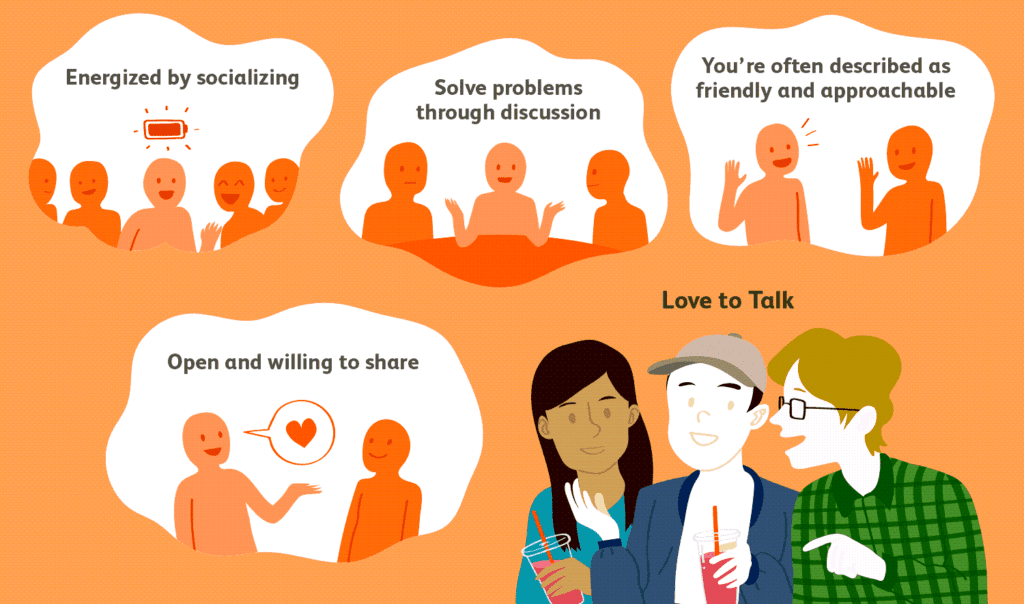
People with more extraverted tendencies are often the center of attention — and like it that way. They get their energy by interacting with others, and spending too much time alone seems draining.
As a result, they thrive in social situations, seek social stimulation, and rarely turn down invitations to weddings, parties, and other gatherings.
Extraverts make new friends quickly, partly because they enjoy other people’s energy and engage with people around them. They tend to have an extensive social network and many acquaintances.
Extraverts often are not afraid to introduce themselves to new people and do not avoid unfamiliar situations for fear of messing up or not knowing someone.
Extraverts may be the ring leader for weekend activities, after-work cocktail hours, or other social events. In addition, extraverts are often keen to expand their social circles by pursuing new interests and activities.
Extraverts aren’t likely to dwell on problems or ponder difficulties. So, while they experience difficulties and troubles like anyone else, extraverts are often more able to let it roll off their backs.
Extraverts are often adaptable to any situation and innovative when problems arise. When working through issues, they usually think best when discussing with others rather than sitting alone and thinking.
Extraverts may be organized, but they don’t necessarily need a plan of action before beginning a project, planning a vacation, or undertaking any task.
While assertiveness may make others uncomfortable, extraverts have no problem voicing their opinions. They often talk before they think, which can be beneficial at times but sometimes gets them into trouble.
People who score high in extraversion do well in careers that allow them to build relationships with others, whether their clients or coworkers. They are well-suited for salesperson, doctor/nurse, lawyer, or teacher jobs.
Common Traits:
- They enjoy being the center of attention.
- Likes to start conversations.
- They enjoy meeting new people.
- Has a wide social circle of friends and acquaintances.
- Finds it easy to make new friends.
- They feel energized when around other people.
- Say things before thinking about them.
Medium Extraversion
This means they get their energy from being around others, but they also get it from being alone at other times. Life is all about balance, and for you, it’s essential to spend time alone and with others.
Medium Extraverts don’t mind being the center of attention at times, but they also don’t seek out ways to be the center of attention.
Because they have introverted and Extraverted traits, they know when to speak up and when to stay silent. On the other hand, they can recognize when to speak up, be assertive, and find the courage to have difficult conversations when necessary.
Jobs for moderately extraverted people include those that allow them to build relationships with others and enable them to work alone for periods. The best jobs for these individuals include counseling, human resources, or being a director.
Low Extraversion
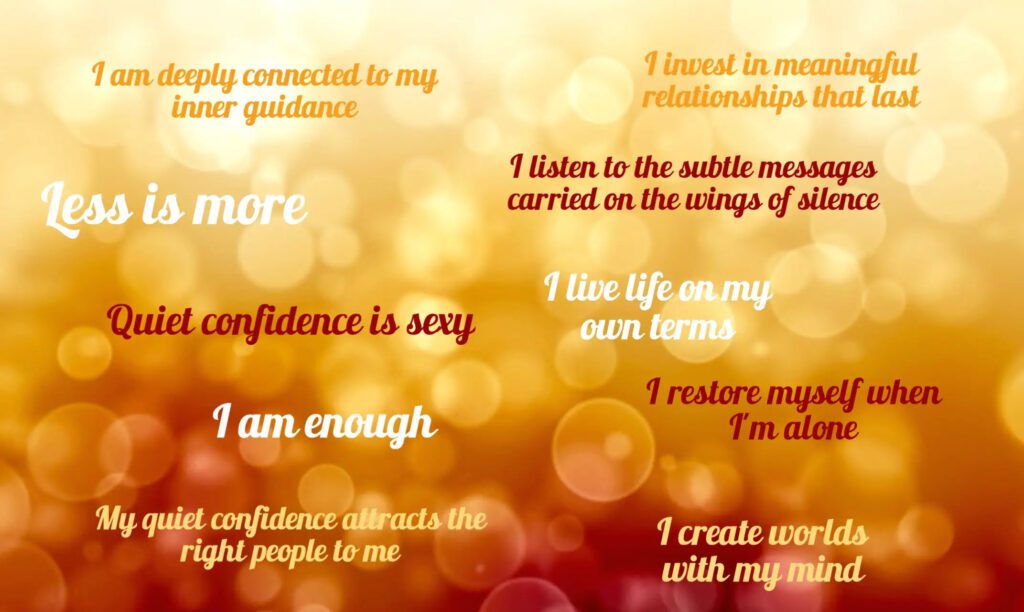
An introvert is a person with low extraversion in The Big Five Personality Traits model.
If you are a low extravert, you might be more introverted and less chatty at the office.
Depending on how social your job is, you might need downtime after work, so you might not go to the happy hour or office birthday party.
If you go, you often only stay for a bit because you must go home to recharge.
If you catch them eating lunch alone, it’s probably not because they’re antisocial or something is wrong; they likely needed a few minutes to themselves because that is how they process.
While enjoying time with others, they get your energy by themselves. Conversely, spending too much time around others leaves them feeling tired.
Others describe them as thoughtful and quiet. However, being the center of attention usually makes them feel uncomfortable. They may not be a social butterfly, but they do a fantastic job building relationships with others.
Introverts typically have a few close friends rather than many acquaintances, and their relationships with others are usually very long-lasting.
Introverts do best in jobs that allow them to spend most of the day alone. However, if they are put into a position requiring too much time spent with others, they will leave work completely exhausted.
The best jobs for introverts include those involving art, technology, or science, such as photography, lab work, or computer programming.
Common Traits
- Prefers solitude
- Feels exhausted when having to socialize a lot
- Finds it difficult to start conversations
- Dislikes making small talk
- Carefully thinks things through before speaking
- Dislikes being the center of attention
Is it Extravert or Extrovert?
Many ask, “What is the correct spelling of the word extravert?”
Is it with an “a” as in extravert or with an “o” as in extrovert?
It is okay to use either spelling. Most people think both versions of the spelling mean the same thing, so both are considered equally acceptable.
We needed to decide which spelling to use when developing this site. We decided on “extravert.” You may see the spelling using the “o,” but we tried to stay consistent for the most part.
Why the “a” and not the “o”?
First, from a traditionalist point of view, the term “extraversion” wasn’t a part of psychology until Carl Jung introduced it into the lexicon of the science world. Psychologists, especially in technical work, have often used the spelling with an “a.”
In addition, contemporary research and test development around the Five-Factor and HEXACO models have consistently used the “a” spelling. It is generally the psychologically acceptable way of spelling it.
Second, from an etymological perspective, the Online Dictionary of Etymology sheds further light on the spelling with the “a” by showing that “extravert” comes from the German word Extravert, for “outside,” and Latin word vertere, “to turn.”
Extra vs. Extro
In Latin, the etymology also shows that “extra” means “out of/outward/outside” and “nitro” means “into/inward/inside.”
If Latin and word etymology aren’t your thing, look at the practical side. The prefix “extra” is common and often used with other words like extraordinary, extrapolate, extraterrestrial, extravagant, etc.
In the English dictionary, “extro” appears as a prefix less than ten times, with six variations on “extroversion.”
People often wonder where the “o” came from, and nobody knows. Some think it’s because it sounded better or was more symmetrical with the sound and spelling of introversion. This drives the purists crazy.
In a Scientific America Article, “The Difference between Extraversion and Extroversion” (2015), psychologist Scott Barry Kaufman indicates that it was just an error by Phyllis Blanchard in a 1918 paper, where she not only used “o” various but also redefined the meaning of the constructs.
Regardless of the spelling source, it became a popular way to spell it around the 1920s. As language continues to evolve, it has become a widespread alternative.
In conclusion, we’re using “extravert” because it’s the original spelling, which is how the psychological sciences generally spell it, and we wanted consistency in our work.

